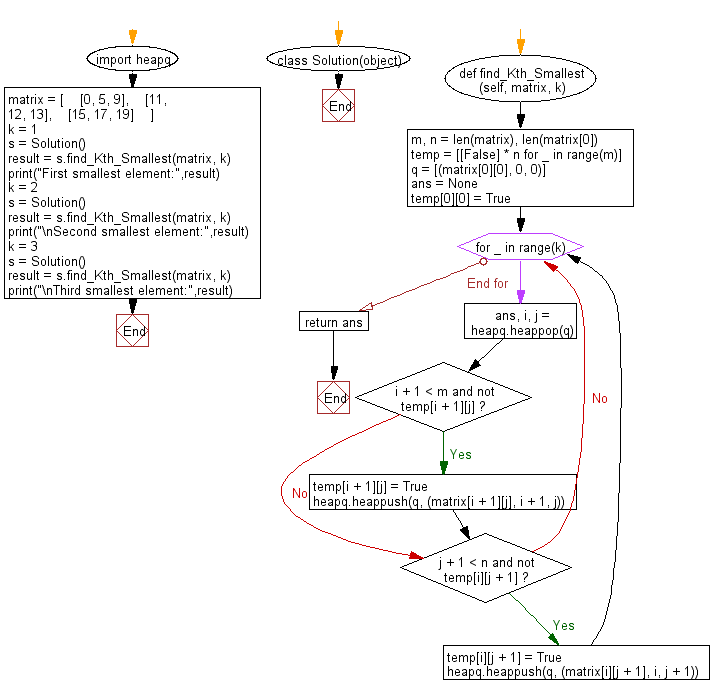Python: Find the kth smallest element in the matrix
Python heap queue algorithm: Exercise-12 with Solution
Given a n x n matrix where each of the rows and columns are sorted in ascending order, write a Python program to find the kth smallest element in the matrix.
Assume k is always valid, 1 ≤ k ≤ n2 .
Sample Solution:
Python Code:
import heapq
class Solution(object):
def find_Kth_Smallest(self, matrix, k):
"""
:type matrix: List[List[int]]
:type k: int
:rtype: int
"""
m, n = len(matrix), len(matrix[0])
temp = [[False] * n for _ in range(m)]
q = [(matrix[0][0], 0, 0)]
ans = None
temp[0][0] = True
for _ in range(k):
ans, i, j = heapq.heappop(q)
if i + 1 < m and not temp[i + 1][j]:
temp[i + 1][j] = True
heapq.heappush(q, (matrix[i + 1][j], i + 1, j))
if j + 1 < n and not temp[i][j + 1]:
temp[i][j + 1] = True
heapq.heappush(q, (matrix[i][j + 1], i, j + 1))
return ans
matrix = [
[0, 5, 9],
[11, 12, 13],
[15, 17, 19]
]
k = 1
s = Solution()
result = s.find_Kth_Smallest(matrix, k)
print("First smallest element:",result)
k = 2
s = Solution()
result = s.find_Kth_Smallest(matrix, k)
print("\nSecond smallest element:",result)
k = 3
s = Solution()
result = s.find_Kth_Smallest(matrix, k)
print("\nThird smallest element:",result)
Sample Output:
First smallest element: 0 Second smallest element: 5 Third smallest element: 9
Flowchart:

Visualize Python code execution:
The following tool visualize what the computer is doing step-by-step as it executes the said program:
Python Code Editor:
Have another way to solve this solution? Contribute your code (and comments) through Disqus.
Previous: Write a Python program to merge multiple sorted inputs into a single sorted iterator (over the sorted values) using Heap queue algorithm.
Next: Write a Python program to find the nth super ugly number from a given prime list of size k using Heap queue algorithm.
What is the difficulty level of this exercise?
Test your Python skills with w3resource's quiz
Python: Tips of the Day
Creates a dictionary with the same keys as the provided dictionary and values generated by running the provided function for each value:
Example:
def tips_map_values(obj, fn):
ret = {}
for key in obj.keys():
ret[key] = fn(obj[key])
return ret
users = {
'Owen': { 'user': 'Owen', 'age': 29 },
'Eddie': { 'user': 'Eddie', 'age': 15 }
}
print(tips_map_values(users, lambda u : u['age'])) # {'Owen': 29, 'Eddie': 15}
Output:
{'Owen': 29, 'Eddie': 15}
- New Content published on w3resource:
- Scala Programming Exercises, Practice, Solution
- Python Itertools exercises
- Python Numpy exercises
- Python GeoPy Package exercises
- Python Pandas exercises
- Python nltk exercises
- Python BeautifulSoup exercises
- Form Template
- Composer - PHP Package Manager
- PHPUnit - PHP Testing
- Laravel - PHP Framework
- Angular - JavaScript Framework
- React - JavaScript Library
- Vue - JavaScript Framework
- Jest - JavaScript Testing Framework
